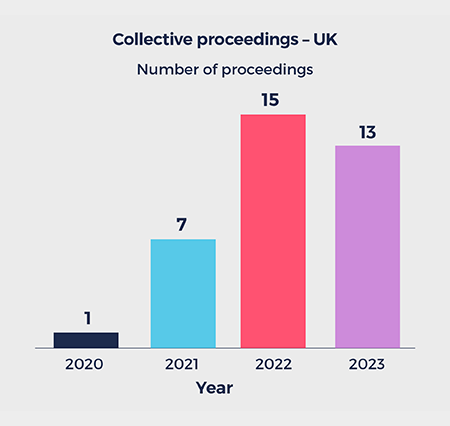Global Antitrust in 2024: 10 key themes
Consumer driven enforcement
consumer facing businesses in the regulatory spotlight
IN BRIEF
With another year characterized by shocks to the global economy and a cost-of-living crisis, governments, authorities and private litigants worldwide have found a renewed impetus on putting consumer protection at the heart of enforcement action, regulatory reform and redress – both as part of and in addition to existing antitrust laws. All indications are that 2024 will see an even closer and more expanded focus on the consumer.
![]()
This strict separation between consumer protection and competition – it’s...breaking down…a lot of the competition issues really touch on consumer protection and vice versa.
Aviv Nevo
Director, Federal Trade Commission’s Bureau of Economics – December 2023
.
In detail
Growing focus on consumer protection and online choice architecture
![]()
Businesses are increasingly required to make challenging judgments on whether to continue practices that comply with established antitrust principles or to make changes to head off potential enforcement under broader notions of consumer harm.
Jan Rybnicek
Antitrust Partner, Washington, DC
In line with the global rise of populist movements, the Biden administration’s Federal Trade Commission (FTC) and Department of Justice (DOJ) Antitrust Division have increasingly been moving away from focusing on consumer welfare toward enforcement against a broader range of harms. This expansion has been far-reaching, with the agencies having focused on commercial practices across a wide variety of sectors. Particularly notable, for example, has been the FTC’s stated expansion of Section 5 of the FTC Act – a broad prohibition against “unfair methods of competition” – which the FTC has said will be used to “focus on stopping unfair methods of competition in their incipiency based on their tendency to harm competitive concerns”. The FTC has prioritized the pharmaceutical sector, an area it perceives as having widespread consumer harms, issuing a September 2023 policy statement announcing “improper” patent listings may be challenged under the prohibition, and then accusing 10 major companies of doing so in relation to over 100 listed patents. The FTC’s revived use of the Robinson-Patman Act, a Depression-era law banning price discrimination, has also targeted the pharmaceutical industry, probing rebates or fees in exchange for allegedly excluding lower-cost drugs. Beyond pharma, the FTC has since launched Robinson-Patman Act investigations into pricing practices in the wine and spirits and soft drinks industries in its efforts to protect small businesses.
In parallel, the FTC has pursued both wide-ranging consumer protection investigations into “dark patterns” in the tech space used to “trick or manipulate consumers into buying products or services” and a ban on hidden and bogus fees. That approach mirrors the one being adopted across Europe. In the UK, for example, the Digital Regulation Cooperation Forum – an association of the UK’s competition, privacy and telecoms regulators established to enhance cross-disciplinary cooperation – issued guidance in August 2023 to companies on its expectations regarding online choice architecture, similar to those published by the Dutch Consumer and Markets Authority (ACM). The UK’s Competition and Markets Authority (CMA) has also bolstered its enforcement efforts in this space, including via recent enforcement action against an online retailer for its alleged use of misleading urgency claims, and shown a desire to focus on rolling subscription contracts and fake reviews in new powers proposed in the Digital Markets, Competition and Consumers Bill (DMCC Bill).
More broadly, the UK government’s November 2023 “strategic steer” to the CMA requested that outcomes for consumers be central to the CMA’s enforcement prioritization. Similarly, the European Commission (EC) has emphasized its focus on the effective enforcement of consumer rights and the protection of vulnerable consumers, including in the enforcement of existing antitrust laws. This is reflected in practice, with several antitrust investigations across Europe (including by the EC, the CMA and the ACM) having sought to frame themselves as targeting “exploitative unfair trading condition abuses”.
New and pending reforms to further bolster consumer protection enforcement
2024 looks set to deliver an even greater lease of life to consumer protection enforcement, with new and pending consumer protection-focused powers.
In addition to the growing focus on consumer protection issues in antitrust enforcement cases, businesses should expect an additional wave of separate consumer law enforcement powers as authorities seek to acquire direct and strengthened powers to enforce consumer law akin to their competition law enforcement powers and processes. For example, under the DMCC Bill, the CMA is seeking additional powers to investigate and enforce consumer law and to directly impose fines of up to 10 percent of worldwide turnover without needing to prove an infringement in court.
![]()
All businesses – not just digital businesses – will need to review the way in which they interact with consumers in light of what is likely to be a tougher and more aggressive enforcement regime, backed by big new fining powers. The UK government has tasked the CMA with focusing its use of strengthened consumer protection tools on all sectors where consumers are feeling the cost-of-living crisis hardest.
Andrew Austin
Dispute Resolution Partner, London
These proposals sit alongside:
- the newly in force EU Digital Markets Act (DMA) and EU Digital Services Act (DSA) which also focus on expanding consumer choice;
- the strengthened tools of the German Federal Cartel Office, including to carry out sector wide inquiries looking at competition and consumer protection issues (other authorities, such as the Italian Competition Authority, are being promised similar powers, while still others, such as the Spanish Competition Authority, have publicly called for such powers); and
- the widening activity by authorities with dual competition and consumer protection powers, including the Australian Competition and Consumer Commission and the ACM. A clear indication of this being the ACM’s focus on greenwashing practices, including intensified consumer protection enforcement against misleading green claims by manufacturers and e-commerce operators.
Businesses therefore need to be joined up across antitrust, consumer and privacy regulation, as well as across jurisdictions, to navigate these overlapping regimes.
![]()
When it comes to online choice architecture and consumer, competition and privacy matters, businesses will need to pay close attention to – and prepare for – the significant strengthening of the CMA’s consumer law enforcement powers under the DMCC Bill. Together with regulators, businesses will need to think holistically about the practical impact of the growing myriad of consumer-focused regulation.
Sharon Malhi
Antitrust Partner, London
Private enforcement action also set to continue to have a strong consumer-focused agenda
The thriving environment for mass claims, in particular in the UK, has increasingly driven prospective class representatives to pursue collective actions with a consumer-focused agenda. Applications for collective proceedings orders filed in the UK in 2023 continue to include major opt-out claims brought on behalf of large classes of UK consumers involving “abuse of dominance” antitrust claims that have a strong focus on consumer devices, consumer choice and transparency.

Although the UK Competition Appeal Tribunal requires proposed class representatives to demonstrate, for example, that they have an arguable claim, including a credible methodology for establishing any class wide losses, it has been willing to grant repeated “bites at the cherry” to achieve this and to stretch the definition of what may constitute an “antitrust claim”. This invigoration of the claimant bar in the UK runs alongside the lively mass claim activity in the US, where consumer-focused theories of harm are regularly invoked, and elsewhere in Europe (for example Portugal), where there is also an increased prevalence of (threatened) mass claim actions spearheaded by consumer associations invoking direct consumer harm.
Businesses should be wary that the private enforcement landscape will continue to mirror the pro-consumer public enforcement agenda closely.
![]()
The volume of competition damages claims across the UK and Continental Europe continues to rise and shows no sign of abating. Increased regulator focus on consumer-driven enforcement and consumer associations championing consumer-focused private enforcement claims will continue to contribute to an environment where standalone and follow-on competition litigation thrive.
Alvaro Pliego Selie
Antitrust Counsel, Amsterdam
Looking ahead in 2024
So how should consumer-facing businesses prepare?
- Know and map your risk. It is vital to understand which parts of a business may cause tension with the key issues at the heart of the uptick in consumer protection activity – be it online choice architecture, so-called dark patterns, or consumer transparency and fairness – and which should therefore be kept under review.
- Join the dots. Some jurisdictions, such as the UK, the Netherlands and the US, are pioneering new areas of enforcement. Keeping pace with these developments and understanding the contours of “acceptable conduct” in these jurisdictions may shape the development and design of existing and new global products and services. The expansive use of existing tools, the introduction of – and proposals for further – new tools and powers, and industry-changing regulations such as the DMA and DSA make this a growing necessity.
- Prepare internally. Consumer protection-focused action is expected to grow in volume and intensity and to mirror antitrust enforcement action and procedures. Companies will therefore need to be prepared with appropriate internal systems and procedures and ensure that they are thinking of these issues on a holistic and cross-disciplinary basis – including in conjunction with in-house antitrust, privacy, consumer protection and compliance teams.
With thanks to Tom Morgan, Dan Wylde, Martin Dickson, Haris Ismail, Katie Kissinger and Sabina Pacifico for their contributions to this theme.
- Introduction
- 01. Taking center stage global antitrust for the mid-2020s
- 02. Merger enforcement the path to clearance gets even tougher
- 03. Investing across borders in 2024 – strengthened controls to protect domestic capabilities
- 04. Digital markets antitrust and artificial intelligence – the next frontier?
- 05. Consumer driven enforcement consumer facing businesses in the regulatory spotlight
- 06. In focus: life sciences and pharma – conduct and commercial practices under the microscope
- 07. Antitrust and sustainability will 2024 bring regulatory alignment or will the chilling effect of uncertainty persist?
- 08. Dominance and monopolization back to the future?
- 09. Antitrust investigations uptick in enforcement with tougher powers and increased interagency cooperation
- 10. Cross-border claimant strategies – focused on investigations and litigation
- Download the full report
Authors
-

Andrew Austin Partner, Head of London Dispute Resolution
London
-

Sharon Malhi Partner, Antitrust Competition and Trade
London, Dublin
-

Alvaro Pliego Selie Counsel
Amsterdam
-

Jan Rybnicek Partner
Washington, DC